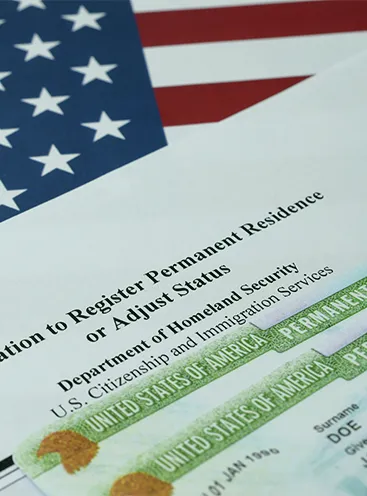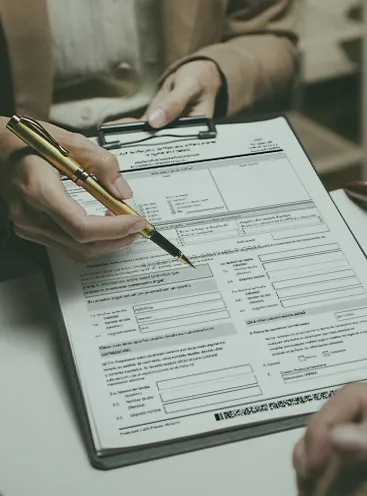MON – FRI (8am - 6pm)
After being granted asylum in the United States, asylees become eligible to apply for a Green Card, also known as permanent residency. This process, known as adjustment of status, marks a significant step towards securing long-term stability and eventually U.S. citizenship. If you're wondering how long it takes to get Green Card after asylum approval, this guide covers the key aspects to consider.
An asylee becomes eligible to apply for a Green Card one year after their asylum status is granted. However, how long it takes to get Green Card after asylum approval can vary due to different factors, making preparation and timing essential.


Timing is a critical factor in how long it takes to get Green Card after asylum approval. While asylees become eligible to apply one year after their asylum status is granted, it’s essential to prepare well in advance.
The U.S. immigration system is complex, and processing times can be lengthy, often extending well beyond the initial one-year waiting period. Delaying the application can lead to unnecessary complications.
Early preparation allows applicants to gather all necessary documentation, address any potential issues, and ensure that their application is complete and accurate. Moreover, beginning the application process as soon as eligibility is reached can help avoid the risk of status changes in their home country or other factors that might affect their asylum status, reducing how long it takes to get Green Card after asylum approval.
To apply for a Green Card, the most critical requirement is physical presence in the U.S. for at least one year after being granted asylum. This ensures that the individual has established a stable life in the U.S. Understanding this requirement is crucial for anyone concerned about how long it takes to get Green Card after asylum approval.
The asylee must not have abandoned their asylum status. Need legal advice? Contact Serving Immigrants today for expert assistance.


Derivative asylees, including the spouse and children of the principal asylee, are also eligible to apply for a Green Card, they must have been physically present in the U.S. for at least one year.
These family members must have been included in the original asylum application or granted derivative asylum status after the principal asylee received asylum. They must meet the criteria of derivative asylum status.
This includes maintaining their relationship to the principal asylee; for instance, a child must remain unmarried and under 21 years old. If the relationship changes, such as a child getting married or turning 21, they may lose their eligibility for a Green Card as a derivative asylee.
When applying for a Green Card, asylees must submit Form I-485 and other required documentation. Providing the correct documents will help ensure a smoother process and influence how long it takes to get Green Card after asylum approval. See how Form I-485 looks
Additional documents include a government-issued identity document, such as a passport or national ID card, and a birth certificate. Two recent passport-style photographs must also be included. Furthermore, if the applicant has any criminal history, certified police and court records of any arrests or convictions must be provided. These documents help USCIS verify the applicant’s identity, legal status, and continued eligibility for permanent residency.
Depending on the circumstances, supplementary documentation like advance parole or Form I-693 may be necessary. Failing to include these documents can prolong how long it takes to get Green Card after asylum approval. For instance, if the applicant has traveled outside the U.S. after being granted asylum, they must provide evidence of advance parole, a document that allows certain non-citizens to re-enter the U.S. after traveling abroad. Without advance parole, the applicant’s Green Card application could be considered abandoned.
Another important document is Form I-693, Report of Medical Examination and Vaccination Record, which may be required to ensure the applicant meets the health-related requirements for admissibility. This form must be completed by a USCIS-approved doctor. For personalized legal advice, contact us today.

Common mistakes while filling out Form I-485, such as providing insufficient evidence of physical presence or using an outdated form, can delay how long it takes to get Green Card after asylum approval. Double-checking all information is critical to avoid unnecessary delays.
This evidence can include pay stubs, rent receipts, or other official documents proving the applicant’s continuous residence. Another common error is submitting an outdated version of the form or incorrect filing fees.
Additionally, applicants sometimes overlook the importance of providing complete and consistent information across all sections of the form. Any discrepancies, even minor ones, can raise red flags and lead to requests for additional evidence or interviews. To avoid these pitfalls, applicants should double-check all information, ensure that all required documents are attached.
The following are the necessary steps to complete Form I-485, essential for individuals seeking to obtain a Green Card.
Collect detailed information about your background, including biographical data, immigration history, and current status in the U.S.
Include information about your entry into the U.S., such as visa details, passport information, and any prior immigration applications.
Provide details about your family members, including their names, relationship to you, and their immigration status.
List your employment history, including job titles, employers, and dates of employment.
Report any involvement in criminal activities, including arrests, charges, or convictions.
Carefully review the form for accuracy and honesty. Providing false information can result in delays, denial, or removal from the U.S.
Seek legal assistance if needed to ensure the form is filled out correctly and completely. If you’re seeking legal guidance, contact us to help you.
The processing time for Green Card applications varies, typically taking several months to over a year, depending on factors such as the workload at USCIS. External factors like changes in immigration laws can also affect how long it takes to get Green Card after asylum approval. On average, the process can take anywhere from 8 to 14 months, but in some cases, it may take longer. After submitting the application, applicants will receive a receipt notice from USCIS.
During the processing period, USCIS may issue a Request for Evidence (RFE) if additional documentation or clarification is needed. It's important to respond to any RFEs promptly to avoid further delays. Applicants should also be aware that processing times can be influenced by external factors such as changes in immigration laws or policies, which can impact the overall timeline. For this process, it is advisable to have the help of an expert asylum attorney.
Explore the most frequently asked questions about how long it takes to get green card after asylum approval:
Processing times can vary, typically taking several months to over a year depending on USCIS workload and other factors.
In 2024, asylees can apply for a Green Card (permanent residency) one year after being granted asylum. However, the time it takes to actually receive the Green Card after applying can vary. On average, processing times range from 8 to 14 months, but they may extend longer depending on factors such as the USCIS office workload, the completeness of the application, and external changes like immigration policy updates.
Yes, asylees must pay the application fee and biometric services fee when filing Form I-485.
You may travel abroad if you obtain advance parole. Traveling without it can lead to your application being considered abandoned. Want to dive deeper? Click here for more information about advance parole.
If your application is denied, you may refile. The denial usually doesn't impact your asylum status but might affect the fees.